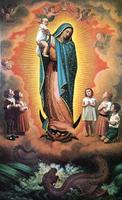Message Feb 21, 2006
By Gudrun Schultz
LifeSiteNews.com
MANILA, Philippines, February 21, 2006 – The bishops of the Philippines have responded emphatically to growing pressure from anti-life activists, calling for accountability from Catholics on moral issues.
The Catholic Bishops Conference of the Philippines (CBCP) have rallied Catholic leaders throughout the country to educate parishioners on the immorality of artificial birth control methods, in response to a concerted onslaught by population control advocates.
Supported by the United Nations, activists for population control have launched an aggressive assault on the country, pushing for anti-life legislation that would limit family size to two children, increase the social acceptance and availability of artificial birth control and give greater access to abortion.
House Bill 3773, the responsible Parenthood and Population Management Act of 2005, is now before parliament. "There's a hidden agenda behind the population bill," Archbishop Fernando Capalla of Davao, president of the Roman Catholic Bishops' Conference of the Philippines, told reporters. "All this is being done in the name of business." Capalla accused foreign companies that manufacture contraceptives of backing the strong lobby for the passage of Bill 3773, reported Ecumenical News International.
A US$1.4 million grant was given by the United Nations to help finance the population control program.
"The bishops were appalled by the swift release of the grant and the filing of the reproductive health bill and the launching of the health department's population control programs," said Jo Imbong, legal counsel of the Catholic Bishops' Conference.
In response, the bishops have called for greater accountability from parishioners on moral issues. Those Catholics who promote or utilize artificial birth control methods may not be able to receive communion or other sacraments.
The bishops have instituted a course for parishioners on the fundamentals of Church teaching, called the Basic Ecclesiastical Communities seminar. Catholics are required to take the course, which runs for eight consecutive Sundays, before receiving sacraments for themselves or their children, and upon entering adulthood.
The course includes teachings on the basics of the faith, Bible study, Christian leadership, family and life apostles, salvation history, and the changing Church.
Sister Regina Arguelles of the Daughters of Our Lady of the Sacred Heart, who works with the CBCP in offering the seminars, said the Catholic bishops have been alarmed by the “continuing moral decay” that was eating up the society.
The bishops are firm on the necessity of participating in the seminars before being allowed to receive sacraments.
“That’s the idea. That’s exactly the Church’s message. If you want to be a Catholic, act like one and follow the Church’s teachings,” Sister Arguelles said.
A prominent mayor was not allowed to receive Catholic burial rites in the Church, after failing to participate in the course. The Manila Standard reports that following the incident, all government officials in the region signed up for the course.
Although there have been a number of reported situations where individuals have been denied communion or access to other sacraments, the decision is not mandated by the CBCP, who says it is up to the individual priest or bishop to decide.
See related LifeSiteNews coverage:
Thousands Rally in Philippines to Protest Population Control Bill http://www.lifesite.net/ldn/2005/mar/05030705.html
PHILIPPINE BISHOPS VOW EXCOMMUNICATION FOR RU-486 http://www.lifesite.net/ldn/2000/oct/00100402.html
[Also see: Being Catholic]







<< Home